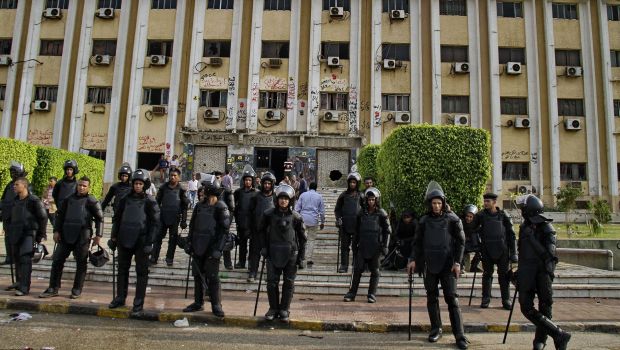
Egyptian security forces stand guard in front of the Al-Azhar Islamic university in Cairo, Egypt, Wednesday,Oct. 30, 2013. (AP Photo/Ahmed Abd El Latef, El Shorouk)
The committee member informed Asharq Al-Awsat: “This article is one of the main items of the constitution to guarantee the independence of Al-Azhar to protect the country and the people from a fatwa war,” adding, “Al-Azhar wants to reach a majority constitution which represents all Egyptians, upholds the higher interest of the state, and preserves the country’s Islamic identity.”
Meanwhile, the 50-member committee continued discussions on Wednesday of the outstanding points of contention, particularly articles related to the army, the system of governance, and the Shura Council (upper chamber of parliament).
The committee member told Asharq Al-Awsat: “The 50-member committee has almost finished its work and has begun the last reading of the preliminary draft of the constitution in preparation for discussion in the General Assembly. However, there are articles that have not been drafted yet, and they will be presented to the General Assembly to decide on them. These include a decision on whether to change the name of the Shura Council.”
The committee member added that an agreement had been reached to remove an article which stipulated that Al-Azhar must be consulted on all issues relating to Islamic Shari’a law. Article 4 of the 2012 constitution is now set to read: “Al-Azhar is an independent inclusive Islamic institution, which specializes in its own affairs, and takes charge of Islamic preaching and teaching in Egypt.”
“Al-Azhar representatives confirmed that Al-Azhar will not accept the organization being placed above other authorities, or granted a political role which could be used by others for their own political ends,” the source said.
The member also pointed out that Egypt’s Supreme Constitutional Court would be responsible for clarifying the controversial second article of the constitution, which deals with the “principles” of Islamic Shari’a law.
The source said: “Article 2 of the constitution has been sufficiently explained by the Supreme Constitutional Court regarding the term ‘Sharia principles’ in order to achieve what is required, in that Islamic Sharia is the basis for all legislation, and that the term ‘principles’ is sufficient to enact forthcoming legislation in a way which does not abandon Islamic Sharia in any form.”
The constitutional committee member also confirmed that representatives of Al-Azhar had insisted that the text of Article 2 is kept the same and not amended. This would see the article remain the same as it was in the 1971 Constitution, with Al-Azhar serving as the first line of defense of Egypt’s Islamic identity.
Article 2 of the Egyptian constitutions of 1971 and 2012 states: “The state’s religion is Islam, its language is Arabic, and Islamic Shari’a is the source of its legislation.”
The committee member revealed that the Orthodox Church representative had threatened to withdraw from the 50-member committee on Wednesday if any clarifying or explanatory text was added to Article 2.
He added: “The new constitution states the independence of the post of Grand Sheikh of Al-Azhar and the inability of his being removed by the president, as well as the selection for this position to take place by election by members of the Azhar Council of Senior Scholars.”
The Council of Senior Scholars is the highest religious authority at Al-Azhar in Egypt. It was reformed on July 17, 2012, following the January revolution, and had previously been disbanded by President Nasser. At certain times in Egypt’s history, the Grand Sheikh of Al-Azhar has been appointed by the president of the republic.
Legal experts on Wednesday warned that the new constitution could be voided because of the committee’s exceeding of the time limit set by the Constitutional Declaration issued by interim President Adly Mansour. This constitutional declaration had granted the 50-member committee a maximum of 60 days to produce a final draft and is set to run out on November 8.
Members of the committee, however, interpreted the 60-day limit as “60 working days”, not including official holidays, extending the deadline to December 3, according to committee spokesman Mohamed Salmawy.
